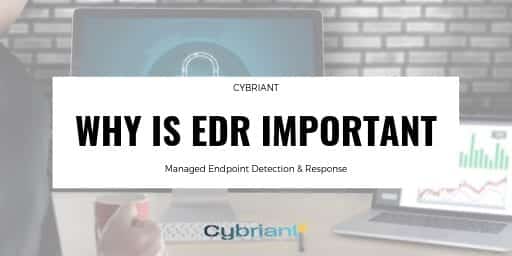Why is EDR important? It’s a question each organization will need to answer for themselves. Take a look at the top reason you may consider adding managed EDR to your security strategy.
Why is EDR Important?
Endpoint Detection and Response (EDR) is defined as a set of cybersecurity tools that are designed to detect and remove any malware or any other form of malicious activity on a network.Managed EDR solutions are used to detect and assess any suspicious activity on the network endpoints. It is becoming a preferred resource for most enterprises for ensuring their network security. It’s important to consider EDR as well as SIEM, and they work better together. What is Managed EDR Security? Read more here. The reasons which make EDR important for businesses are as follows:
Proactive Approach
With the increasing dependence of technology on businesses, the digital perimeter of companies is expanding very fast. The approach of reactive management of cyber threats and security issues for the network is no longer a prudent strategy. The current approach is to identify cyber threats and potential attacks before they occur and take remedial actions immediately. EDR solutions are best suited for this approach of proactive management of cybersecurity threats to your network. Why is EDR important? It can help you detect even malware that has polymorphic codes which keep evolving on its own and take suitable corrective action. Traditional antiviruses are no longer suitable for providing security to your network as hackers have become smarter and devised malware and threats which can easily bypass antiviruses. Read more: Traditional Antivirus vs. EDR
Better Data Monitoring and Management
EDR solutions are designed in such a manner that they can collect and monitor data on each of the endpoints on a network. They collect and monitor data about potential cybersecurity threats to the network. The data is collected and stored in the form of a database on endpoints. The stored data can be further analyzed for determining the root cause of any security issues and also for detecting any potential cyber threat. Collection, monitoring, and analysis of such high-quality forensic data also help in preparing a superior incident response and management strategies.
Suitable for Large Scale Networks
As discussed above, businesses have to expand the scale of their networks tremendously to meet their business requirements. Businesses have been revolutionized by the growth in technology which has led them to expand their digital perimeter drastically. Enterprises can have hundreds of thousands of endpoints on their networks. Such a large-scale network makes it more vulnerable to cyber attacks as it can be breached from multiple points. Traditional antiviruses are not powerful enough to provide a sufficient level of security to such massive networks. EDR solutions are specifically designed to meet the requirements of such large networks. They can easily collect and monitor data continuously on all these endpoints due to their design and architecture. This exceptional feature of EDR solutions makes them very important for network security in any enterprise. When you outsource the management of your EDR, you’ll have a team of experts look at your systems on a 24/7 basis.
Powerful Inbuilt Data Analytics
A good EDR solution comes with powerful inbuilt data analytics. These analytical tools help you to identify cybersecurity threats to your network in the early phases of its development and allow you to deal with them effectively. Plus, when you use a managed EDR service, you’ll be notified by a cybersecurity expert and you don’t have to worry about false positives. The different inbuilt analytical tools offered by EDR solutions can provide you with features like cloud-based intelligence, machine learning, statistical modeling, etc. which are very helpful for your IT team.
Compatibility and Integration with Other Security Tools
Another added advantage of using EDR solutions is their versatility and compatibility. These systems are very versatile and are compatible with and integrate seamlessly with other security tools. You can easily integrate your EDR solutions with other security tools like malware analysis, network forensics, SIEM tools, threat intelligence, etc. to provide better security to your network. Most of the EDR systems and solutions feature open and documented APIs and reference architecture. This is a great answer to the question why is EDR important? You can also go a step ahead and integrate your EDR solutions into Integrated Cybersecurity Orchestration Platforms (ICOPs) from different vendors. This excellent compatibility and integration of EDR solutions with a host of other security tools provide you with added protection and makes EDR solutions a must-have resource for your network.
Observing Endpoints Without Interfering
Burdening the endpoint with heavy client software is not recommended. The traditional antivirus programs had this drawback as they took considerable space on the endpoints and burdened it. Endpoints on an EDR solution play a very important role. They help to identify potential cyber threats and issues and allow for preparing an appropriate incident response. It is the endpoint that is responsible for detection and response processes. Good EDR solutions use less space and have minimal footprints on the endpoints. They are lightweight and non-intrusive and facilitate continuous observation and monitoring of the endpoints without interfering with their functionalities.
Whitelisting and Blacklisting Options
EDR systems come integrated with whitelisting and blacklisting options. Whitelisting refers to the features wherein only specified applications are labeled as whitelisted and are allowed to run on a system, while other applications are blocked. These features are a good starting point for ensuring network safety and security. They can be used as the first line of defense, especially against hackers whose modus operandi is known. It can keep you protected against such hackers and cybercriminals. In addition to the whitelisting and blacklisting features, a typical EDR solution also includes other advanced security features which make use of behavioral analytics to detect new types and trends of cyberattacks.
Better and Real-Time Incident Response and Management
EDR solutions are very effective in collecting continuous information on malware footprints and other types of potential cyber threats to the network. Such data is stored on the network endpoints which helps in preparing suitable incident response and management strategies. All information that is essential for preparing effective incident responses is collected in real time by EDR solutions. You can use EDR tools to provide you instant access to this rich and valuable repository of data which will help you be updated on any type of potential security threats to your network. In certain cases, specific cyber threats can be identified in the initial phases as they are developing in the network environments. You can design appropriate incident management responses in these early stages which can help to eliminate the threat immediately before it becomes a full-fledged threat to your network. The forensic data and evidence collected by theEDR tools also cut down the investigative time and time needed for preparing incident responses and management by your IT team.



